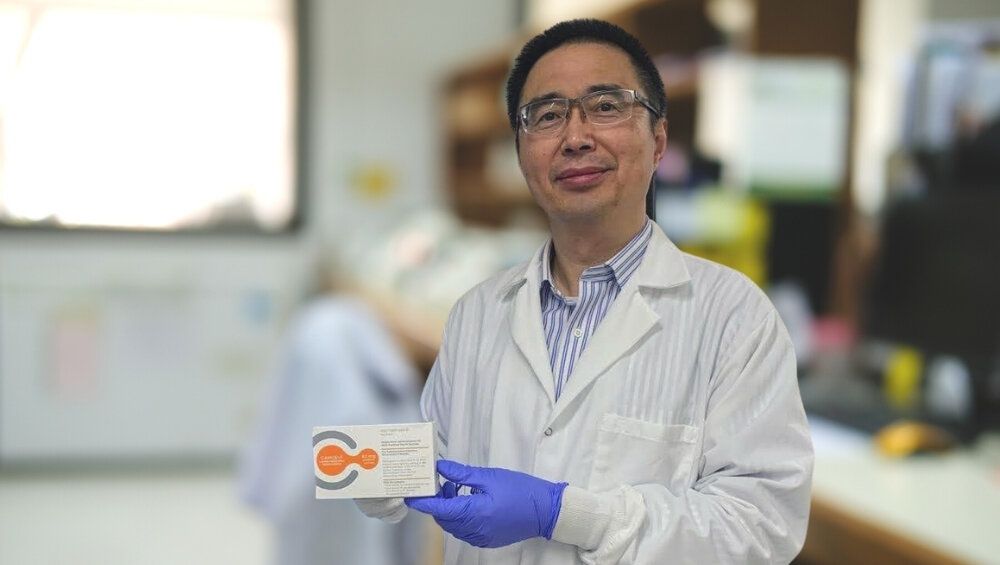Newark-based Foresee Pharmaceuticals Sets Its Sights on China

March 31, 2021 –
Partnership with GenScience Pharmaceuticals Brings Cutting-edge Technology to Asian Market
Most would agree that Foresee Pharmaceuticals’ innovators possess foresight. The core product is a proprietary drug-delivery technology that controls a medication’s release over an extended period — from a few weeks to up to six months.
However, the clinical-stage pharma company’s name was inspired by the technology’s advantages: comfort, compliance, convenience and cure. In other words, four Cs.
Consider the company’s novel FP-001 program — Camcevi — a leuprolide mesylate injectable suspension (LMIS) for prostate cancer. Since patients need fewer injections, they’re more likely to be comfortable and compliant, says Dr. Yuhua Li, co-founder and vice president of research and development at Foresee. The treatment is more convenient, and it can lead to a better treatment outcome.
Global pharmaceutical companies appreciate the potential. Foresee recently entered into an exclusive license agreement with GenScience Pharmaceuticals for the commercialization of Camcevi in China. GenSci is a wholly-owned subsidiary of Changchun High-Tech Industry.
Foresee Pharmaceuticals – Located in Delaware. Focused on the World.
Foresee is based in Taiwan and Newark, Delaware. Why the First State? For one, Foresee spun off from Newark-based QPS, which began as Quest Pharmaceutical Services in 1995.
Located in the Delaware Technology Park, QPS has grown from three people to more than 1,170 in the United States, Europe, India and Asia. However, QPS founder Dr. Ben Chien wanted to explore more options.
In 2004, Li joined QPS to develop a drug-delivery technology and drug-discovery program. “Our original goal is to make good drugs better,” Li said.
In 2011, Foresee spun off from QPS and moved into the Delaware Technology Park incubator on the University of Delaware’s Science, Technology and Advanced Research (STAR) Campus. This location puts the company near major metropolitan cities, Li says. But there are other advantages to being in Delaware.
“It is definitely business-friendly, and it’s family-friendly,” said Li, who has lived in North Carolina, South Carolina and Colorado. “It has beautiful beaches. Also, another important thing, it does not have a sales tax.”
A Matter of Control
It is easy to see why global companies are interested in marketing Foresee’s ready-to-use subcutaneous injectable suspension. Because patients receive a consistent, prolonged medication delivery, they don’t require as many injections. As a result, patients become more compliant. The reduced administration, meanwhile, lowers administration costs.
The controlled-release delivery decreases the risk of side effects, which can happen with dangerous spikes in drug concentrations. It also boosts efficacy because drug concentrations won’t drop too low.
There are three- and six-month depot formulations. In both, a key ingredient is a biodegradable polymer that slowly degrades, letting the drug gradually enter the patient’s system. The technology works best with potent drugs, such as hormones, because patients need fewer injections.
The technology has the potential to treat central precocious puberty, breast cancer and endometriosis, Li said. Foresee is also working on a delivery system for buprenorphine, which treats narcotic addiction. The extended-release formulation can help patients stick to a treatment schedule, which is often an issue with opioid addiction. They won’t need to visit the medical office as often.
Building Partnerships
Because Foresee is a clinical-stage pharmaceutical company, it relies on partners like GenSci to tackle the expensive endeavor of bringing products to market. “It’s complicated, and you need to have great resources to do it,” Li explains. “For a small company to build up the sales force — it’s a very tough task.”
Time is critical. By the time a drug is ready for the marketplace, developers are deep into 10 years or more of a 20-year patent life, Li notes. A company with an established reputation and sales force can hit the ground running. Under the partnership terms, GenSci will cover all costs of development, registration and commercialization in the territory.
Foresee receives an initial $8 million upfront payment and a combination of regulatory milestones, technology transfer milestones and commercialization milestones, with payments totaling up to $123.85 million. Foresee will also receive a share of the product revenue in the territory.
Foresee already has a European partner and is pursuing one in the United States. Presently, the company has about 40 employees, some of whom work virtually. As the company expands, Li hopes to tap talent at the University of Delaware.
“It’s a very good resource,” Li says, “and a very good environment.”
Newsletter Sign Up
Stay Up To Date With Delaware